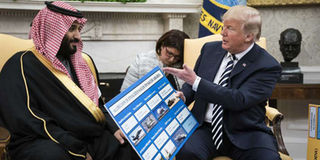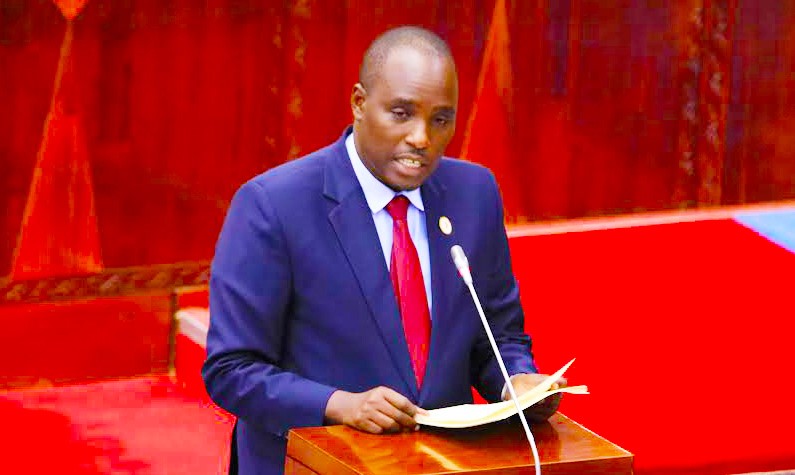Trump's focus is money as Saudi prince visits

What you need to know:
- The $12.5 billion the Saudis were paying for planes, tanks, ships and munitions shown in the posters was "peanuts" for the oil-rich kingdom, Trump joked before cameras in the Oval Office. "You should have increased it," he told Mohammed.
WASHINGTON - Saudi Crown Prince Mohammed bin Salman kicked off his US visit with talks and lunch at the White House, where President Donald Trump displayed posters showing recent Saudi weapons purchases from the United States, saying that "we make the best equipment in the world."
The $12.5 billion the Saudis were paying for planes, tanks, ships and munitions shown in the posters was "peanuts" for the oil-rich kingdom, Trump joked before cameras in the Oval Office. "You should have increased it," he told Mohammed.
The poster's list of finalized sales fell far short of the $110 billion figure that Trump cited during his visit to Riyadh last May, and some were initiated and approved during the Obama administration. Additional deals might still come to fruition.
The prince earlier visited the Capitol to meet with top congressional leaders, many of whom raised concerns over the Saudi-led coalition's role in the war and massive humanitarian crisis in Yemen, and US support for the Saudis.
"We talked about the importance of our relationship, no doubt," Sen. Bob Corker, R-Tenn., chairman of the Senate Foreign Relations Committee, said in a floor statement after his own session with Mohammed. "But we strongly, strongly pushed back on what is happening right now in Yemen and asked them to take strong corrective actions."
Lawmakers have sharply criticized the war Saudi Arabia has waged with US support over the past several years in Yemen, in which at least 1,000 civilians have been killed in bombing attacks. Sen. Robert Menendez, the ranking Democrat on the Senate Foreign Relations Committee, called for a political solution.
"We also talked about the enrichment that they're pursuing and some of the concerns that existed there," Corker said, touching on a disagreement over whether Saudi Arabia should insist on retaining its option to enrich domestic uranium resources under a nuclear cooperation agreement. The deadlock over an agreement has been an obstacle to the ability of firms using US material or technology to bid on construction contracts for a pair of electricity-producing reactors the Saudis want to build.
In group meetings on Capitol Hill, Mohammed spent more than two hours in 20- to 30-minute sessions with the congressional leaders and heads of national security committees from both sides of the aisle.
Vice President Mike Pence and H.R. McMaster, the president's national security adviser, planned dinners in Mohammed's honor, as did the Saudi ambassador to the United States, Khalid bin Salman, the crown prince's brother.
Mohammed was expected to meet with Jared Kushner and Jason Greenblatt, who are in charge of the administration's effort to forge an Israeli-Palestinian peace deal, as well as CIA Director and secretary of state-designate Mike Pompeo, and Defense Secretary Jim Mattis. In addition to being the heir apparent to the Saudi throne, Mohammed is also his country's defense minister.
When they met in the Oval Office, and later in the Cabinet Room, Trump was effusive in his praise for Mohammed. "We really have a great friendship, a great relationship," following what he said were "strained" ties during the Obama administration.
He recalled counterterrorism agreements made with Islamic nations during his visit last May to Saudi Arabia and said "the relationship is probably stronger than it's ever been."
Mohammed, in response, described the bilateral relationship as "really huge and really deep." Picking up on Trump's theme, he said that Saudi-US ties had created "more than four million jobs in the United States of America, directly and indirectly," as well as jobs in Saudi Arabia.
Trump said that the Saudis were "also footing a big part of the bill for defense" in "the whole Middle East" but made clear that he expects Riyadh to do more. Referring to the nearly completed battlefield defeat of the Islamic State in Iraq and Syria, Trump said that US involvement was "coming to an end in that part of the world. And we'll be able to get out of certain areas that we've wanted to get out of for a long period of time. And other countries can handle it."
In a December telephone call, Trump asked King Salman to contribute $4 billion to reconstruction and stabilization efforts in parts of Syria cleared of the Islamic State and thought he had gotten a Saudi commitment, The Washington Post reported last week.
But most of Trump's public comments surrounding the visit Tuesday concerned what the Saudis have spent in the United States and the additional expenditures Trump is expecting.
Trump has cited a variety of numbers in the past about US-Saudi commerce, and Tuesday was no exception. The president said "we talked about $400 billion worth of investment, of which we've already invested and seen invested $200 billion to our companies, to various other places, and people that make things."
Those figures contradict figures released by the White House and are several times larger than figures provided by the leading companies involved in purchases and investments both countries make in each other's economies.




